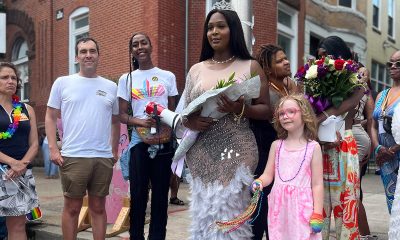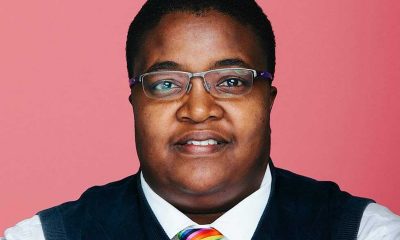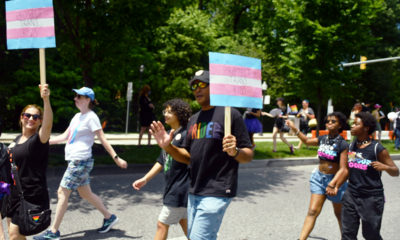National
Kennedy Library showcases Kameny letters to JFK
Pioneering activist wrote to White House from 1961-1963
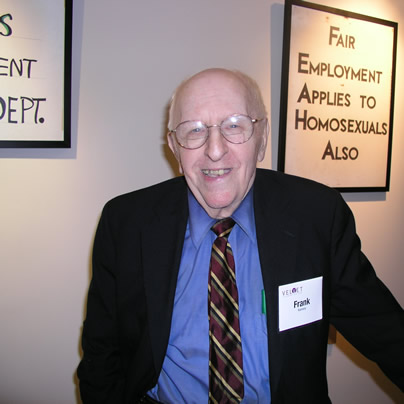
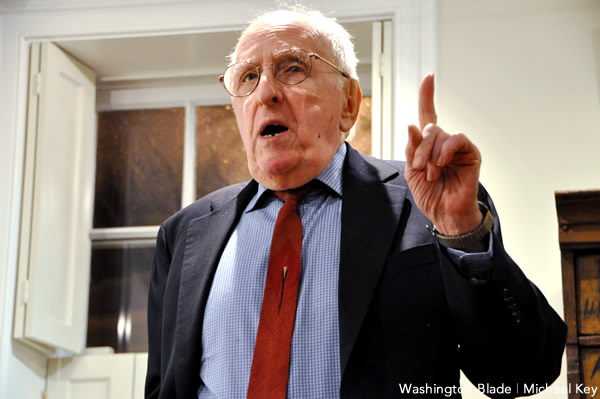
‘In 1961, it has, ironically, become necessary for me to fight my own government, with words,’ Frank Kameny wrote to President Kennedy. (Washington Blade file photo by Michael Key)
The John F. Kennedy Presidential Library in Boston is taking steps this month to publicize the dozens of letters, pamphlets and press releases that D.C. gay rights pioneer Frank Kameny sent to President Kennedy from 1961 to 1963.
In a prominent write-up on the Kennedy Library website, library official Stacey Chandler, a reference archives specialist, said the letters poignantly document Kameny’s role as one of the nation’s first advocates for the rights of gay people before the highest levels of the U.S. government.
Chandler said the letters and other documents from Kameny are part of the library’s archives and are available for viewing online. Kameny died at the age of 86 in 2011.
“In World War II, I willingly fought the Germans, with bullets, in order to preserve and secure my rights, freedoms, and liberties, and those of my fellow citizens,” Kameny told Kennedy in a letter dated May 15, 1961 that’s part of the archive collection.
“In 1961, it has, ironically, become necessary for me to fight my own government, with words, in order to achieve some of the very same rights, freedoms, and liberties for which I placed my life in jeopardy in 1945,” wrote Kameny. “This letter is part of that fight.”
In a letter dated Aug. 28, 1962 Kameny told Kennedy, “You have said: ‘Ask not what your country can do for you, but what you can do for your country.’ We know what we can do for our country; we wish to do it; we ask only that our country allow us to do it.”
Kameny wrote the letters in his role as president of the Mattachine Society of Washington, D.C., the city’s first gay rights organization that Kameny co-founded in 1961 and led through the 1960s and early 1970s.
Chandler noted in her article that the Mattachine Society of Washington came into being shortly after the U.S. Supreme Court declined to take the case of a legal challenge that Kameny filed against the then U.S. Civil Service Commission.
In a first-of-its-kind action, Kameny contested the Civil Service Commission’s decision in 1958 to fire him from his job as an astronomer with the Army Map Service in Washington following an investigation into alleged homosexual activity by Kameny.
Among other things, the Commission cited a 1953 executive order by President Dwight Eisenhower that barred from the federal workforce anyone with a history of “sexual perversion” and other “immoral or notoriously disgraceful conduct.” Homosexual acts between consenting adults were considered among the prohibited conduct.
“Kameny wrote an astounding number of letters throughout his lifetime of advocacy, most of which are now in the Library of Congress,” Chandler wrote in her Kennedy Library article. “The huge volume of his correspondence makes the personal nature of his letters to President Kennedy especially surprising for archivists here,” she said.
“In these letters, he tenaciously argued for the right of gay Americans to work as civil servants,” she said.
In the same May 15, 1961 letter in which he told of his combat service in World War II, Kameny told Kennedy, “Yours is an administration that has openly disavowed blind conformity…You yourself have said, in your recent address at George Washington University, “…that (people) desire to develop their own personalities and their own potential, that democracy permits them to do so.’
“But your government, by its policies certainly does not permit the homosexual to develop his personality and his potential,” Kameny wrote.
In a Feb. 28, 1963 letter, Kameny told Kennedy about his fledgling effort to persuade the American Psychiatric Association to remove homosexuality from its list of mental disorders.
“Homosexuality is neither a sickness, disease, neurosis, psychosis, disorder, defect, nor other disturbance, but merely a matter of the predisposition of a significantly large minority of our citizens.”
Chandler said the Kennedy Library’s archivists could find no response from Kennedy or anyone else at the White House to Kameny’s letters.
“In fact, the only response we’ve found in our archives is a brief note from John W. Macy, Chairman of the U.S. Civil Service Commission, to Bruce Schuyler, Secretary of the Mattachine Society, who requested a meeting,” Chandler wrote.
In his note to Schuyler, Macy said, “It is the established policy of the Civil Service Commission that homosexuals are not suitable for appointment to or retention in positions in the Federal service. There would be no useful purpose served in meeting with representatives of your Society.”
Chandler said that in a March 6, 1963 letter to Kennedy, Kameny appeared to be referring to the government’s lack of response to his and the Mattachine Society of Washington’s overtures to the Kennedy administration.
“We wish to cooperate in any way possible, if the chance for friendly, constructive cooperation is offered to us by you,” Kameny wrote, “but if it continues to be refused us, then we will have to seek out and to use any lawful means whatever, which seem to us appropriate, in order to achieve our lawful ends, just as the Negro has done in the South when he was refused cooperation.”
In 1975, after several court rulings against the Civil Service ban on gay employees that Kameny played a role in organizing, the Civil Service Commission ended its prohibition on gay federal workers. In 2009, John Berry, the gay director of the U.S. Office of Personnel Management, the successor to the Civil Service Commission, presented Kameny with an official government apology for his 1958 firing.
“Things have changed,” Chandler quoted Kameny as saying around the time Berry issued the apology with the full backing of President Obama. “How they have changed. I am honored and proud that it is so.”
The Kennedy Library, which is part of the U.S. National Archives and Records Administration, highlighted its collection of Kameny correspondence this month as a follow-up to a video that the NARA released in support of the It Gets Better Project, Chandler said.
LGBT rights advocates led by gay author and syndicated columnist Dan Savage created the It Gets Better Project to draw attention to bullying targeting LGBT youth. With President Obama among the political leaders and celebrities who have spoken in an “It Gets Better” video, organizers say the project has helped lift the spirits of many LGBT youth that have suffered from taunts and physical violence.
NARA director David S. Ferriero, who holds the title of Archivist of the United States, recorded a recent “It Gets Better” video that is available for viewing on the NARA website.
“It is so exciting that the Kennedy Library is highlighting Kameny’s letters to President Kennedy,” said Charles Francis, founder of the Kameny Papers Project, which arranged for Kameny’s voluminous correspondence and writings to be given to the Library of Congress.
Francis noted that copies of the Kameny letters to President Kennedy are among the collection at the Library of Congress but that the letters at the Kennedy Library are the originals.
“This was done on Frank’s typewriter from Frank’s living room,” Francis said.
“It’s progress. It’s real progress,” he said of the prominent treatment the Kennedy Library is giving to the Kameny letters.
See the Kennedy Library article on Kameny letters here.
U.S. Supreme Court
Concern over marriage equality in US grows two decades after first Mass. same-sex weddings
Gay and lesbian couples began to marry in Bay State in 2004

Two decades after Massachusetts became the first state to legalize same-sex marriage, a new study reveals both significant progress and ongoing challenges for married LGBTQ couples in the U.S., with a growing sense of insecurity about the future of their rights.
The Williams Institute at UCLA School of Law surveyed 484 married same-sex couples from all 50 states and D.C. The study, released Monday, marks the 20th anniversary of legal same-sex marriage in the U.S.
Researchers found that 93 percent of respondents cited love as a primary reason for marrying, with 75 percent also mentioning legal protections. Over 83 percent reported positive changes in their sense of security, and 74.6 percent noted improved life satisfaction since marrying.
However, the study also highlighted persistent discrimination and growing concerns about the future. About 11 percent of couples who had a wedding reported facing prejudice during the planning process.
Alarmingly, nearly 80 percent of respondents expressed concern about the potential overturning of the 2015 Obergefell v. Hodges decision, which legalized same-sex marriage nationwide. This anxiety has been exacerbated by initiatives like Project 2025, a conservative policy blueprint that some fear could roll back LGBTQ rights if implemented.
The possibility of a former President Donald Trump victory in the upcoming election has further intensified these concerns. Many respondents cited Trump’s previous U.S. Supreme Court appointments and his statements on LGBTQ issues as reasons for their apprehension. One participant stated, “The thought of another Trump presidency keeps me up at night. We’ve come so far, but it feels like our rights could be stripped away at any moment.”
The current political climate has 29 percent of respondents considering moving to another state, with 52.9 percent citing socio-political concerns as a primary reason. This reflects a growing sense of insecurity among LGBTQ couples about their rights and freedoms.
Brad Sears, founding executive director of the Williams Institute, noted, “The data clearly show that marriage equality has had a profound positive impact on same-sex couples and their families. However, it also reveals ongoing challenges and serious concerns about the future of these rights in light of current political trends and the upcoming election.”
Christy Mallory, legal director at the Williams Institute and lead author of the study, added, “This research provides crucial insights into the lived experiences of same-sex couples two decades after marriage equality began in the U.S. The high level of concern about potential loss of rights underscores the continued importance of legal protections and public support for LGBTQ+ equality.”
The study found that 30 percent of surveyed couples have children, with 58.1 percent of those parents reporting that marriage provided more stability for their families. However, many of these families now worry about the security of their legal status in the face of potential policy changes and shifting political landscapes.
As the nation reflects on two decades of marriage equality, the study underscores both the transformative power of legal recognition and the ongoing need for vigilance in protecting LGBTQ+ rights. The findings highlight the complex reality faced by same-sex couples in America today: Celebrating hard-won progress while grappling with uncertainty about the future, particularly in light of upcoming political events and potential shifts in leadership.
State Department
State Department hosts meeting on LGBTQ rights and foreign policy
Event took place before Pride Month reception

Secretary of State Antony Blinken on Thursday hosted a group of LGBTQ activists and politicians from around the world at the State Department.
The event — described as a “Convening on U.S. Foreign Policy: National Security, Inclusive Development, and the Human Rights of LGBTQI+ Persons” — took place before the State Department’s annual Pride Month reception. Participants included:
• Jessica Stern, the special U.S. envoy for the promotion of LGBTQ and intersex rights
• U.S. Ambassador to the U.N. Linda Thomas-Greenfield
• U.S. Trade Representative Katherine Tai
• U.S. Ambassador to India Eric Garcetti
• Suzanne Goldberg, senior advisor to the Under Secretary of State for Civil Security, Democracy, and Human Rights
• Under Secretary of State for Civilian Security, Democracy, and Human Rights Uzra Zeya
• U.S. Agency for International Development Senior LGBTQI+ Coordinator Jay Gilliam
• USAID Counselor Clinton D. White
• National Security Council Senior Director for Democracy and Human Rights Kelly Razzouk
• Assistant U.S. Secretary of Health Adm. Rachel Levine
• National Security Council Human Rights Director Jess Huber
• U.N. Assistant Secretary General for Human Rights Ilze Brandt Kehris
• Icelandic Ambassador to the U.S. Bergdís Ellertsdóttir
• Council for Global Equality Co-Executive Director Mark Bromley
• Outright International Senior Advisor for Global Intersex Rights Kimberly Zieselman
• Essy Adhiambo, executive director of the Institute for Equality and Non Discrimination in Kenya
• Pau González, co-chair of Hombres Trans Panamá and PFLAG-Panamá
“Forty-five years ago, thousands gathered in D.C. in what became the first national march for LGBTQI+, demanding their voices be heard,” said Thomas-Greenfield in a post to her X account that showed her speaking at the event. “We must continue to carry forward the spirit of these pioneers and fight for equal rights and dignity for all.”
Forty-five years ago, thousands gathered in DC in what became the first national march for LGBTQI+, demanding their voices be heard.
We must continue to carry forward the spirit of these pioneers and fight for equal rights and dignity for all. 🏳️🌈🏳️⚧️ pic.twitter.com/oph2Ahmfhq
— Ambassador Linda Thomas-Greenfield (@USAmbUN) June 28, 2024
President Joe Biden in 2021 signed a memo that committed the U.S. to promoting LGBTQ and intersex rights abroad as part of his administration’s overall foreign policy.
“LGBTQI+ rights are human rights,” said Blinken. “Our government has a responsibility to defend them, to promote them — here and everywhere.”
Blinken noted consensual same-sex sexual relations remain criminalized in 64 countries, with the death penalty in 11 of them.
He specifically highlighted Uganda’s Anti-Homosexuality Act and Hungarian Prime Minister Viktor Orbán’s government’s “smearing scapegoating, stigmatizing LGBTQI+ persons — vilifying them with degrading labels, denying them equal rights, normalizing violence against them.” (Gay U.S. Ambassador to Hungary David Pressman this month marched in the annual Budapest Pride parade.)
Blinken noted Iraqi MPs earlier this year “passed legislation that punishes same-sex relations with up to 15 years in prison.” He also pointed out that Indonesian lawmakers approved a new criminal code banning extramarital sex.
“In a nation where same-sex couples cannot marry, these laws effectively make all same-sex conduct illegal and they undermine privacy for all Indonesians,” said Blinken.
“We’re defending and promoting LGBTQI+ rights around the world,” he said.
Blinken noted seven countries — Barbados, St. Kitts and Nevis, Antigua and Barbuda, Dominica, Namibia, Singapore, the Cook Islands — have decriminalized consensual same-sex sexual relations over the last two years. He also highlighted Greece, Liechtenstein, and Thailand this year extended marriage rights to same-sex couples, and other countries are banning so-called “conversion therapy.”
“These achievements are possible because of incredibly courageous human rights defenders and government partners on the ground, but I believe America’s support is indispensable,” said Blinken. “When we engage — sometimes publicly, sometimes privately, sometimes both — when we share our own knowledge and experience, we can and we do achieve change.”
Blinken also announced the U.S. now considers sexual orientation and gender identity are part of the International Covenant on Civil and Political Rights that took effect in 1976.
“This is one of the key treaties committing nations to upholding universal rights,” he said.
“In our regular reporting to the council on human rights, we will continue to include incidents of discrimination or abuse committed against LGBTQI+ persons, now with the clear framework of this well-supported interpretation,” added Blinken. “That will further empower our efforts.”
Blinken reiterated this point and the Biden-Harris administration’s commitment to the promotion of LGBTQ and intersex rights abroad when he spoke at the State Department’s Pride Month event.
“Defending, promoting LGBTQI+ rights globally is the right thing to do, but beyond that, it’s the smart and necessary thing to do for our country, for our national security, for our well-being,” he said.
The White House
Jill and Ashley Biden headline White House Pride celebration
First lady celebrated historic pardons of LGBTQ veterans

First lady Jill Biden and the president and first lady’s daughter, Ashley Biden, headlined the White House Pride celebration on the South Lawn on Wednesday, followed by a performance by singer and actress Deborah Cox.
“My dad has built the most pro-equality administration” in history, Ashley Biden said, crediting the work of LGBTQ people of color like Marsha P. Johnson, a prominent figure in the Stonewall uprising of 1969, as well as “so many of you [who] have continued to lead their fearless fighting against against injustice here and around the world.”
She introduced her mother as “the woman who taught me to be myself up showed me in so many ways how I can make a difference” and who “works every single day, tirelessly, to ensure that all people have the opportunities and freedoms that they deserve.”
“I hope that all of you feel that freedom and love on the South Lawn today,” Jill Biden said.
Her remarks were briefly interrupted by a protestor’s chants of “no Pride in genocide,” which was drowned out by chants of “four more years.”
The first lady noted how many of the attendees came “here from states that are passing laws targeting LGBTQ Americans.”
“There are those who see our communities and our families and wish to tear them down,” she said, “those who can’t see that the world is so much bigger and [more] beautiful than they know — but when our homes are threatened, when they strip away our rights, and deny our basic humanity, we say, ‘not on our watch.'”
“Pride is a celebration, but it is also a declaration,” the first lady said, highlighting the U.S. Supreme Court’s ruling in Obergefell v. Hodges nine years ago, which established marriage equality as the law of the land.
She then credited the accomplishments of the Biden-Harris administration on matters of LGBTQ rights, including the repeal of the previous administration’s ban on military service by transgender servicemembers and the FDA’s loosening of restrictions on blood donation by gay and bisexual men.
The first lady also celebrated the president’s announcement earlier on Wednesday that he will pardon LGBTQ veterans who were discharged and court martialed because of their sexual orientation or gender identity.
“We will never stop fighting for this community,” she said.

-

 Canada1 day ago
Canada1 day agoToronto Pride parade cancelled after pro-Palestinian protesters disrupt it
-

 Theater4 days ago
Theater4 days agoStephen Mark Lukas makes sublime turn in ‘Funny Girl’
-

 Baltimore3 days ago
Baltimore3 days agoDespite record crowds, Baltimore Pride’s LGBTQ critics say organizers dropped the ball
-

 Sports4 days ago
Sports4 days agoHaters troll official Olympics Instagram for celebrating gay athlete and boyfriend

